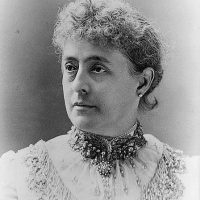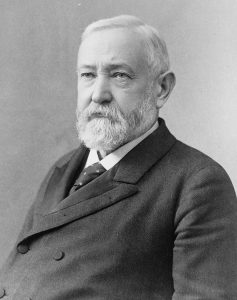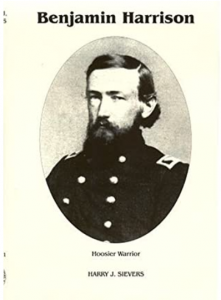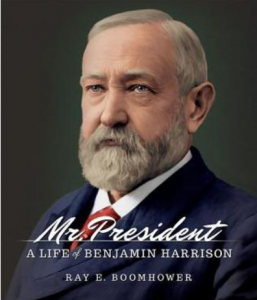Benjamin Harrison
Benjamin Harrison Biography
Overview
Benjamin Harrison (August 20, 1833 – March 13, 1901) was an American lawyer and politician who served as the 23rd president of the United States from 1889 to 1893. He was a grandson of the ninth president, William Henry Harrison, and a great-grandson of Benjamin Harrison V, a founding father who signed the United States Declaration of Independence. [1]
Caroline Harrison

Quick Facts:
| Full Name | Benjamin Harrison |
| Birth Date | August 20, 1833 |
| Birth Place | North Bend, Ohio |
| Death Date | March 13, 1901 |
| Career | Lawyer |
| Spouse(s) | October 20, 1853, to Caroline Lavinia Scott (1832–1892). April 6, 1896, to Mary Scott Lord Dimmick (1858–1948) |
| Children | Russell Benjamin (1854–1936), Mary Scott (1858–1930), Elizabeth (1897–1955) |
| President No. | 23 |
| Presidency Begin | March 4, 1889 | Presidency End | March 4, 1893 |
| Vice President(s) | Levi P. Morton |
| Administation | Millercenter.org |
Harrison was born on August 20, 1833, in North Bend, Ohio, the second of Elizabeth Ramsey (Irwin) and John Scott Harrison’s ten children [35] On his father’s side he was from the very wealthy and influential Harrison family of Virginia whose forefather Benjamin Harrison was came to Jamestown, Virginia around 1630. [36]
Harrison was a grandson of U.S. President William Henry Harrison and a great-grandson of Benjamin Harrison V, a Virginia planter who signed the Declaration of Independence and was governor of Virginia. [37]
Even though his grandfather was President of the United States (elected when Benjamin was 7) his father was not very wealthy but was very distinguished.[38]
Harrison was a very skilled and popular lawyer in Indiana and local Republicans urged Harrison to run for Congress. He initially confined his political activities to speaking on behalf of other Republican candidates, a task for which he received high praise from his colleagues. In 1872, Harrison campaigned for the Republican nomination for governor of Indiana. Former governor Oliver Morton favored his opponent, Thomas M. Browne, and Harrison lost his bid for statewide office.[75] He continued to make speeches on behalf of Republican candidates and policies.[76]
He ran for Governor again in 1876 and narrowly lost again but he gained prominence. [77] In 1879, President Rutherford B. Hayes appointed Harrison to the Mississippi River Commission, which worked to develop internal improvements on the river.[78] As a delegate to the 1880 Republican National Convention the following year,[79] he was instrumental in breaking a deadlock on candidates, and James A. Garfield won the nomination.
In 1880 he was finally elected to the Senate and Harrison served in the Senate from March 4, 1881, to March 3, 1887, and chaired the U.S. Senate Committee on Transportation Routes to the Seaboard (47th Congress) and the U.S. Senate Committee on Territories (48th and 49th Congresses).[80]
Resources
Web Sites:
Books:
REFERENCES
- **Presidential Flag Graphic source: Zscout370 at English Wikipedia, CC BY-SA 3.0 <http://creativecommons.org/licenses/by-sa/3.0/>, via Wikimedia Commons
- (1) https://en.wikipedia.org/wiki/Benjamin_Harrison
- (35) Philip Alexander Bruce; William Glover Stanard (1894). The Virginia Magazine of History and Biography. Virginia Historical Society. pp. 229–
- (36) Bruce 1894, p. 230
- (37) Calhoun, Charles William (2005). Benjamin Harrison. Macmillan. ISBN 978-0-8050-6952-5. p,pp. 7-8
- (38) Calhoun (2005) pp. 21-23
- (75) Moore, Chieko; Hale, Hester Anne (2006). Benjamin Harrison: Centennial President. Nova Publishers. ISBN 978-1-60021-066-2. p. 28
- (76) Calhoun 2005, p. 30
- (77) Calhoun 2005, p.31
- (78) Calhoun 2005, pp. 35-36
- (79) Calhoun 2005, p.36
- (80) Calhoun 2005, p.59




